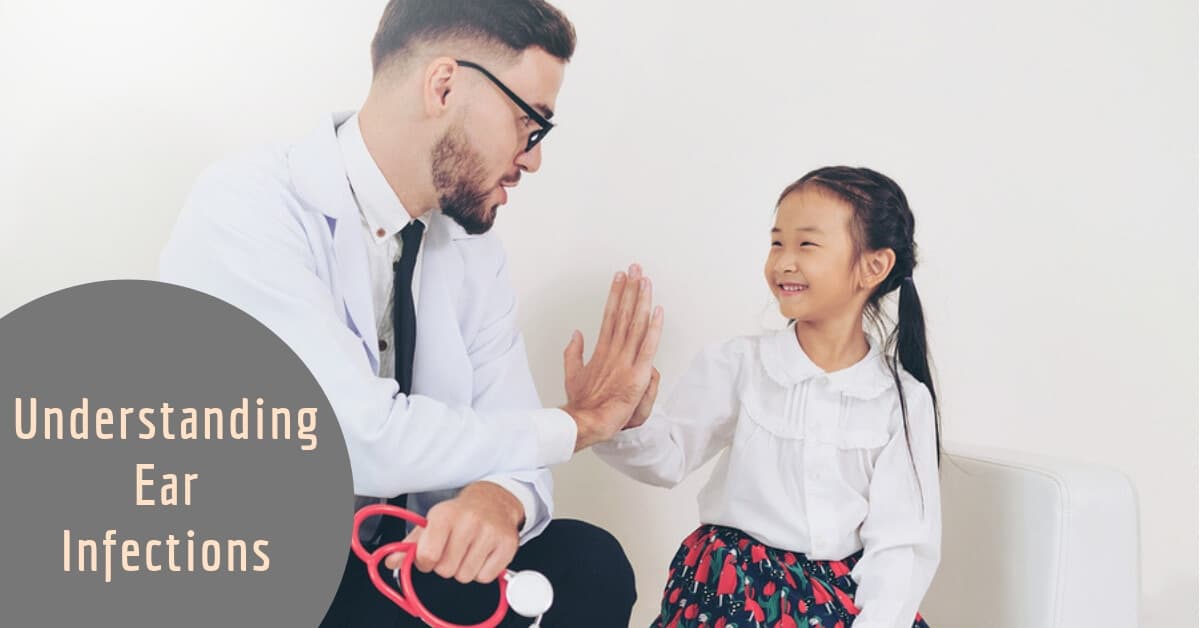Have you been experiencing any pain or discomfort in your ears? Don’t ignore pain in your ears, and visit your physician immediately! Ear infections can cause unbearable pain, and can lead to permanent hearing loss, but if you seek medical attention, they’re easily treated. You’ll be free from discomfort, and save your hearing. It’s likely that either you or a loved one has had an ear infection in the last few years, but what exactly are ear infections, and how do they happen?
What Are Ear Infections?
Ear infections are caused by a fluid buildup in the ear. When fluids become trapped, bacteria or viruses can grow, and this leads to inflammation or infection. It’s common to get an ear infection during or after a cold or flu. There are three main types of ear infections, and these classifications are based on where in the ear the infection is located. You can have an outer, middle, or inner ear infection.
Types of Ear Infections
Outer ear infections are commonly called swimmer’s ear, and these ear infections are more prevalent during the summer. Swimmer’s ear, or outer era infections, are caused by fluids that build up in the outer ear, or gets trapped in the ear canal. Think you might have an outer ear infection? If you pull on the ear, you’ll feel a stretching or pulling of the ear canal, and if there’s an infection, this will cause a lot of pain and discomfort. You’ll also notice an ear drainage with an outer ear infection, and if you’ve noticed any fluid escaping the ear, visit your doctor right away.
Middle ear infections target the middle ear, or eardrum, and will affect your hearing more than an outer ear infection. Finally, inner ear infections cause the most discomfort, and you might experience extreme symptoms such as dizziness, vertigo, hearing loss, or tinnitus.
Who’s at Risk of An Ear Infection?
While anyone can get an ear infection, certain people are more susceptible to ear infections than others, and knowing if you’re at risk can help you be more vigilant. Genetics can lead to ear infections, and certain people are more likely to experience ear infections than others based on the anatomy of their eustachian tubes, the tube connecting the ear to the throat. Ear infections can also be caused by uncontrolled allergies.
Children are the most at risk of ear infections, often caused by a cold or flu. Children have far more ear infections than adults, partly because they get sick more often, and have more upper respiratory infections and cold. Their immune system is also weaker than adults, and viral or bacterial infections are more likely to survive in children than in adults. Finally, in children the eustachian tubes aren’t fully developed, don’t drain fluids as well as in adults, and are more likely to trap fluid in or near the ear.
Ear Infections and Hearing Loss
Ear infections cause more than just ear pain. Other symptoms of ear infections include fever, irritability, headaches, and even nausea. Ear infections can also lead to hearing loss. If you or a loved one has an ear infection, you might experience temporary hearing loss that will go away once your ear infection is treated. This hearing loss is usually due to the fluid blocking the outer, middle, or inner ear. However, ear infections can also damage the cells in the ear, and lead to permanent hearing loss.
Treating Ear Infections
If you have an ear infection, its important to treat your ear infection as soon as possible. Ear infections are easily treated with antibiotics, and the infection will usually be under control within a few days. Outer ear infections can even be treated with eardrops that will quickly attack the infection and reduce pain and swelling. You can also take pain medication to manage discomfort while the antibiotics do their work.
If you’ve recently had an ear infection and are worried about your hearing, visit us today at My Hearing Centers for a hearing test, and make sure you’re still hearing clearly. We’ll work with you to determine your unique hearing loss and hearing needs, and find the perfect treatment options to have you hearing clearly.


